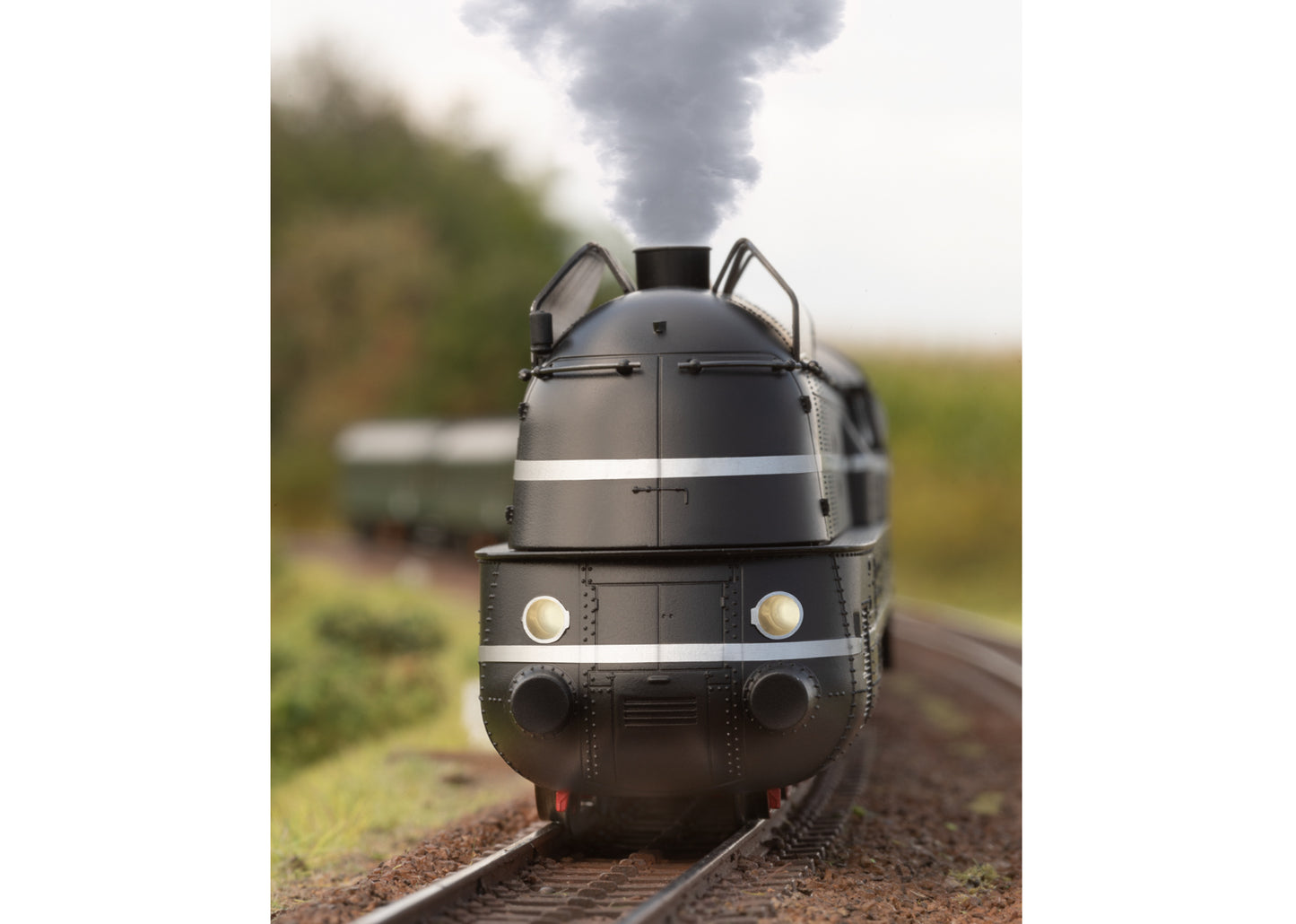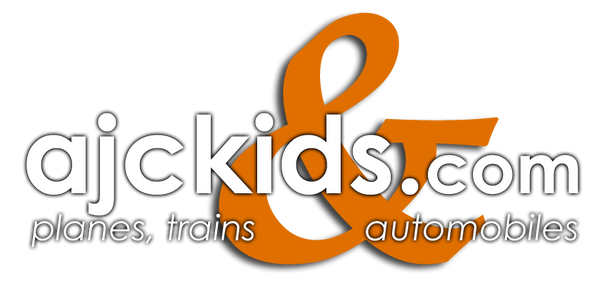Marklin 39662 - Steam Locomotive, Road Number 06 001 -Marklin Insider
Matching Pike Cars are available under Marklin 42265
Prototype: German State Railroad (DR) express steam locomotive, road number 06 001. At its time the most powerful, largest, and heaviest unit on the German State Railroad. Complete streamlining included, inductive magnet on the right side of the locomotive on the trailing truck, and a cover for the coalbunker included. Deep black basic paint scheme with decorative striping. The locomotive looks as it did at the end of the Thirties.
- Completely new tooling.
- Model constructed mostly of metal.
- A variety of separately applied details.
- Factory-installed smoke unit with dynamic smoke exhaust, which varies with the speed.
- Cab lighting can be controlled digitally.
- Firebox flickering can be controlled digitally.
- The cover on the coalbunker can be opened.
- mfx+ World of Operation decoder with extensive operation and sound functions.
Product description
Model: The locomotive has an mfx+ digital decoder and extensive sound functions. It also has controlled, high-efficiency propulsion with a flywheel, mounted in the boiler. Four axles powered. Traction tires. The locomotive and tender are constructed mostly of metal. The locomotive has a factory-installed smoke unit with dynamic smoke exhaust, which varies with the speed. Dual headlights change over with the direction of travel, will work in conventional operation, and can be controlled digitally. Cab lighting and firebox flickering can be controlled separately in digital operation. Maintenance-free, warm white LEDs are used for the lighting. There is a close coupling with a guide mechanism between the locomotive and tender. There is a close coupler with a guide mechanism in an NEM pocket on the back of the tender. The cover on the coalbunker can be opened. Real scale-sized coal is used for the bunker.
The locomotive can be run without limitation on the 437.5 mm / 17-1/4" radius (Radius 2) if attention is paid to the clearance gauge. The locomotive can also be run on the 360 mm / 14-3/16" radius (Radius 1) if the clearance gauge is ignored. Cutouts in the side streamlining for sharper curves can be closed with fill-in pieces included for the purpose. A figure of an engineer, two firemen, brake hoses, and imitation prototype couplers are also included.
Length over the buffers 30.7 cm / 12-1/8".
Steam locomotive, road number 06 001, is being produced in 2022 in a one-time series only for Insider members.
Charlie's Tip
The passenger car set to go with this locomotive is also being offered under item number Marklin 42265 exclusively only for Insider members in 2022. This model can be found in a DC version in the Trix H0 assortment under item number Trix 25060 exclusively for Trix Club members.
Publications
- Special Imprint and Special Products - New items brochure 2022Prototype information
The Class 06 Surprise Steam Locomotive The two units of the class 06 represent a superlative – they were the most powerful express steam locomotives built in Germany. Their origin goes back to 1934, when the DRG's main management, the German State Railroad Central Bureau for Engineering commissioned the purchase of two extremely powerful express units. They were to haul a 600 metric ton express train at 120 km/h / 75 mph on level terrain, be at least 135 km/h / 84 mph fast, and adhere to the standardization design principles. Finally, Krupp in Essen brought a design to fruition, which specified a length (locomotive and tender) of 26.520 meters / 87 feet due to the large boiler dimensions. This long super boiler was also used on the freight train locomotive class 45 developed parallel to the class 06. It therefore required running gear with four sets of driving wheels and a driving wheel diameter of 2,000 millimeters / 78-3/4 inches for the necessary maximum speed. Analogous to the classes 41 and 45 built at the same time, the boiler pressure was set at 20 bar / 290 pounds per square inch and the axle load for the driving wheels could be varied. By selecting other pivot points in the load balancing system, the axle load could be set at 18 or 20 metric tons to enable wider use of these locomotives.
Three-cylinder running gear with two outer cylinders and a third inboard cylinder mounted horizontally and shifted to the front was used to achieve better weight balance and higher starting tractive effort. All of the cylinders had their own Heusinger valve gear, whereby the outer cylinders were applied to the second set of driving wheels and the inboard cylinder conversely was applied to the crank axle of the first set of driving wheels. Streamlining rounded out everything, whereby access to the driving wheels and the trailing truck was left open for the most part due to experience in the past. Considerable difficulties in the production of the boiler delayed starting operation of the two gigantic locomotives: on road number 06 001 until the early part of 1939, on road number 06 002 until even the summer of 1939. In retrospect, the impending war took the German State Railroad's focus off these two units. All the same, road number 06 001 was still tested starting in April of 1939 by the Grunewald Locomotive Testing Bureau for speeds of 80, 100, and 120 km/h / 50, 63, and 75 mph.
On June 15, 1939 there was thus an operational test run with road number 06 001 and a train weight of 678 metric tons on the route Bebra – Frankfurt/Main – Bebra, whereby a cylinder performance of even 3,670 pounds per square inch was briefly reached. Boiler damage however ended the tests at the beginning of July of 1939 and they were not resumed due to the war. The German State Railroad then stationed both units at the Frankfurt/Main 1 maintenance facility and they were used on the routes to Erfurt and Würzburg. Yet due to frequent boiler damages there were longer and longer downtimes. Both units survived the end of the war in storage, road number 06 002 even survived a bomb hit. An overhaul of these locomotives was not done since the subsequent DB saw no possible way to use these two giants. This story ended in 1951 with their retirement.
Features
Warning
| CONTROL UNIT | MOBILE STATION | MOBILE STATION 2 | CENTRAL STATION 1/2 | CENTRAL STATION 3/2 | |
|---|---|---|---|---|---|
| Headlight(s) | X | X | X | X | X |
| Smoke generator | X | X | X | X | X |
| Steam locomotive op. sounds | X | X | X | X | X |
| Locomotive whistle | X | X | X | X | X |
| Direct control | X | X | X | X | X |
| Sound of squealing brakes off | X | X | X | X | |
| Engineer’s cab lighting | X | X | X | X | |
| Flickering Light in Fire Box | X | X | X | X | |
| Whistle for switching maneuver | X | X | X | X | |
| Conductor's Whistle | X | X | X | ||
| Letting off Steam | X | X | X | ||
| Sound of coal being shoveled | X | X | X | ||
| Tipping grate | X | X | X | ||
| Air Pump | X | X | X | ||
| Water Pump | X | X | X | ||
| Injectors | X | ||||
| Sanding | X | ||||
| Coal being shoveled and firebox flickering | X | ||||
| Replenishing water | X | ||||
| Replenishing coal | X | ||||
| Replenishing sand | X | ||||
| Safety Valve | X | ||||
| Switcher Double "A" Light | X | ||||
| Switching maneuver | X | ||||
| Generator Sounds | X | ||||
| Operating sounds | X | ||||
| Rail Joints | X | ||||
| Coupler sounds | X | ||||
| Surrounding sounds | X |
EAN/UPC: 4001883396620















